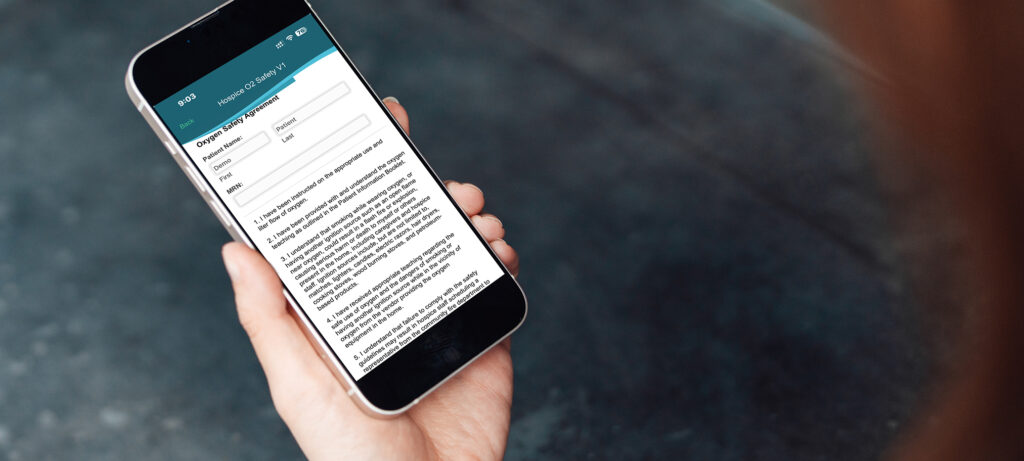Reading Time: 4 minutes
Those who work in hospice care know first-hand about the reams of paperwork required. Forms for referrals, transfers, consent, supplies, nursing assessments, care checklists and more are vital to ensuring compassionate, appropriate end-of-life care. But the sheer volume of paperwork can make it difficult for caregivers to truly focus on their patients.
One option that’s helping several of my customers streamline their workflows is to switch from paper to digital forms. Often times, this includes commonly used forms such as:
- Revocation forms
- Consent forms
- Patient emergency plan
- Bereavement referrals
- Election statements
- Social media photo consent

Here are some advantages to making this change.
- Efficiency: In hospice care, timelines are often uncertain. Having to use snail mail to share important documents or get required signatures can take several days, especially if those who need to be contacted are not geographically nearby. Digitized forms allow information to be entered, updated and shared in real-time, making it easier for the care team as well as the family to have quick access to complete information.
Digital forms also mean much less manual data entry, reducing the time your staff spends on administrative tasks. One customer, Sangre de Cristo Community Care, has gone 98% paperless and estimates the related time savings is equivalent to one full-time employee.
Janell Solomon, Sangre de Cristo’s director of compliance, noted that “None of my colleagues went to nursing school to run papers around.” Having digitized forms lets your team really focus on patient care.
- Improved accuracy: Of course, any time you reduce manual data entry, you reduce the chance of introducing errors into your documentation. Digital forms can also take advantage of integrated validation checks and automatic calculations to add another layer of accuracy to your data. The improved accuracy of digital forms also saves time that your team might otherwise spend tracking down missing information, which helps reduce delays in claim processing and reimbursement.
- Better communication with family and caregivers: Digitizing hospice forms can improve the documentation and care plans that your interdisciplinary groups (IDGs) rely on. This is important not just to ensure compliance, but also to make sure each patient gets the best possible care. Digitized forms can also improve patient and family engagement by making to easier for them to provide input, see key information or updates and communicate with the care team.
- Accessibility and security: When hospice forms are digitized, they can be easily stored and retrieved by authorized staff as needed. Cloud-based technology offers the robust security needed to protect patient information and ensure your agency is compliant with healthcare data regulations.
Keys to successful implementation
It’s normal to expect some resistance to making changes like digitizing forms. But with clear communication about the benefits, thorough training, phased implementation, and strong security for your digital platform, most of the challenges to switching to digital forms can be overcome.
CitusHealth’s digital forms and app-less signature capabilities can help you virtually eliminate paper and end the time-consuming processes of scanning, copying, faxing, emailing and chasing down signatures and data manually. As Sangre de Cristo’s Janelle Solomon said, “We’re not creating paperwork anymore. The CitusHealth solution has a tremendous impact on time and effort and energy.” In addition to the time savings she noted, her team has also seen higher satisfaction rates and better patient care.
Integrating digital forms into workflows will be key to shaping the future of hospice care delivery. Embracing this technology is about more than just keeping up with the times. It’s about making sure every moment caregivers and family spend with patients is focused on providing comfort, dignity and support during their final journey.
Contact us today to see how CitusHealth can help you.
Danielle Maroon
Danielle Maroon is a dedicated professional services employee at Resmed with a passion for excellent healthcare and efficient work environments. While balancing work, she’s devoted to being present, caring and loving to her two sons and her supportive husband.
